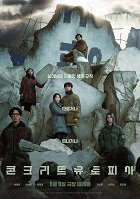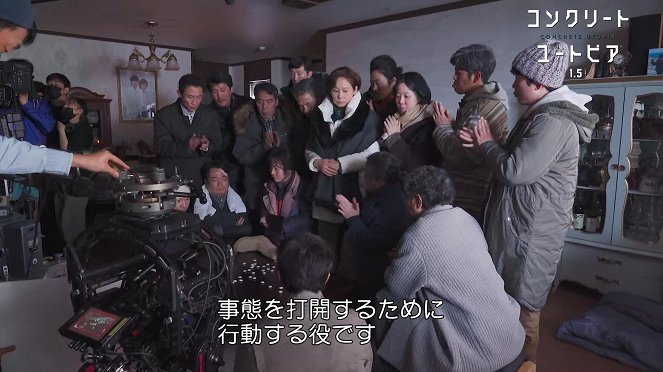Juonikuvaukset(1)
A devastating earthquake reduces Seoul to rubble, with the exception of only one single skyscraper, which presides over the center of the city. Before long, the adverse living conditions there lure the survivors into the building, only to discover that its residents have barricaded themselves inside, and have no intention of letting them in. (Sitges Film Festival)
(lisää)Videot (1)
Arvostelut (4)
I would have expected a sophisticated social satire from the South Korean envoy to the Oscars, especially now, just a few years after the brilliant Parasite. But Concrete Utopia is merely a technically polished post-apocalyptic genre movie with ordinary conflicts between the characters and a kitschy ending that tries for straightforward feeling without first building relationship emotions. It surely works as a blockbuster for the masses, as actor Byung-hun Lee is already a major-league crowd-puller, but the film is rather only for Asian audiences. [Sitges Film Festival]
()
Expecting an ordinary disaster thriller is basically a mistake. Twenty seconds of digital destruction and a few shots of building rubble serve only as an inducement to tell an allegory about the collapse of society and morality as a result of an unforeseen crisis during which people begin to show themselves as selfish, hypocritical and callous monsters. In order for this allegory to work, however, the screenplay makes a mockery of everything else. The idea that one apartment remains entirely unscathed after a terrifying earthquake flattens the whole city of Seoul is absurd. The issue of millions of dead is not addressed in any way, no one deals with the loss of friends and relatives, and the situation in the rest of Korea (let alone the rest of world) is not even mentioned. The story is focused solely on what happens in the building, where a class system immediately emerges when the survivors are divided into apartment owners and those who lost their homes, the rabble condemned to freeze to death in the brutal cold on the broken streets. All possible ills of social inequality are crammed into the story together with criticism of capitalism (for example, a leader is chosen from among the residents, leading within seconds to the creation of a corrupt environment of bribery). An absolute oddity is the passage in which the apartment owners ruthlessly expel everyone else from the building, essentially sending them to their deaths, and then organise for themselves an outdoor party with karaoke and a feast made of supplies that they stole from the ruins of a nearby store, whose owner they had killed. It’s possible to sympathise only with one woman who is the only resident to give any consideration to ethics, so it’s a good thing that the film approaches a large part of the story and most of the subplots from her perspective. Otherwise, it would be a hell of a manipulative construct.
()
I was looking forward to a proper catastrophe blockbuster with Souoth Korea’s biggest star Lee Byung-hun, but I got an uninteresting and dull utopian drama that made me suffer from boredom. The earthquake disaster itself takes up less than five minutes in the film, the rest of it focuses on a group of survivors in an apartment complex dealing with uninteresting stuff. If anything, I was hoping it would veer into dark survival mode, but not even that. For me the worst South Korean film of the year. 3/10.
()
After a devastating earthquake hits South Korea, a single building that serves as a middle-class housing complex remains standing in the rubble of a devastated Seoul. Survivors from all over the area must soon fight over who will and who will not make it to this last refuge. It’s a recipe for social satire that could represent South Korea in the Oscar race next year. But the elements of satire here are at times escalated into such absurd realms that it practically makes the film a comedy, whose contrivances about the characters' behavior in a crisis situation feel more forced and artificial than resembling real human motivations. And this tonal and genre straddling, which is often inherent in Korean films, unfortunately does it a disservice. With this premise, I would have much more appreciated a more serious disaster survival film that dealt with the real logistics of survival in a post-apocalyptic world, and that I, as a viewer, could take seriously. I couldn't really take this one seriously.
()
Kuvagalleria (62)
Kuva © Lotte Entertainment



Mainos